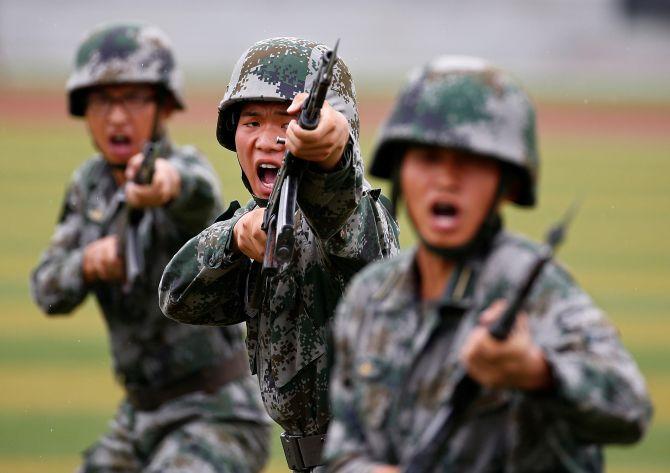
China will resolutely safeguard its sovereignty in the border conflicts with India even at the cost of war, Chinese experts warned on Monday, amid a standoff between the two nations in the Sikkim sector.
As the standoff at the Doka La area continued for the third week, the longest between the two countries, the official media and the think-tanks here said that 'war is possible if the conflict between India and China is not handled properly'.
Of the 3,488-km-long India-China border from Jammu and Kashmir to Arunachal Pradesh, a 220-km section falls in Sikkim.
China will resolutely safeguard its border sovereignty in conflicts with Indian troops even at the cost of war, state-run Global Times daily quoted Chinese experts as saying.
'China is also different from what it was in 1962,' Wang Dehua, a professor at the Shanghai Municipal Centre for International Studies told the daily, reacting to Defence Minister Arun Jaitley's comments that India of 2017 is different from what it was in 1962.
"If they are trying to remind us, the situation in 1962 was different and the India of 2017 is different," Jaitley had said.
'India has been treating China as its biggest competitor since 1962, as both countries share many similarities. For instance, they are both developing countries with huge populations,' Wang said.
'There could be a chance of war if the recent conflict between China and India is not handled properly, observers said, noting that China will resolutely defend its territory and safeguard the border,' the Global Times report said.
'In 1962, China fought a war with India after the latter encroached on Chinese territory, resulting in the deaths of 722 Chinese troops and 4,383 Indian soldiers,' the daily said.
Experts called on both sides to resolve the conflict through dialogue and negotiations, it said.
'Both sides should focus on development rather than conflict or war,' Zhao Gancheng, director of the Centre for Asia-Pacific Studies at the Shanghai Institute for International Studies, told the newspaper.
'A conflict between the two may give other countries a chance to take advantage, for example, the US,' he said.
'India should change its hostile attitude toward China as a good relationship is beneficial for both sides,' Wang said.
The Chinese experts also took exception to reports that India's Defence Ministry is surveying the China-India border in order to build an 'all-weather railway corridor' with broad-gauge network for swift movement of troops and weaponry.
'India is trying to catch up with China in the construction of frontier defence,' Zhao said.
The daily quoted experts saying that in the event of a China-India war, the United States is unlikely to directly get involved, though it may sell weapons to India.
'An attempt to impress Trump'
Another article in the Global Times said that India’s objection to China building the road in the Sikkim sector ahead of Prime Minister Narendra Modi’s visit to the United States was aimed at demonstrating to Washington its ‘firm determination’ to ‘constrain’ China’s rise.
‘Modi took two measures to brace for his meeting with Trump. The first one was to seal a weapons deal with the US. For America, the weapons deal will not only reap enormous monetary gains from India, but also strengthen India’s advantage in the Indo-Pacific region to check China,’ the article said.
‘The other measure aimed to demonstrate to the US India’s firm determination to constrain China's rise,’ the article written by Liu Zongyi senior fellow of the state-run think tank, the Shanghai Institutes for International Studies, said.
‘For example, Indian troops crossed the undisputed Sikkim section of the China-India border and impeded Chinese workers from building roads a few days before Modi's visit to the US,’ it said.
In addition, the Indian government has started an anti-dumping probe into Chinese products, the article said, adding the Modi administration sought US support at the cost of China-India ties and has taken a lead in containing China’s rise.
Apart from the territorial dispute, India announced that it would initiate an anti-dumping probe against high tenacity polyester yarn from China, the article said.
‘Because the border face-off and the announcement of the anti-dumping probe occurred around the same time as Modi’s two-day visit to the US, people link India’s bravura with the Modi-Trump meeting,’ it said.
The daily also downplayed Modi’s visit, saying it was ‘not a historic event, as some media outlets in India boasted, because of the limited results the meeting has achieved’.
At the same time, it noted that Modi has established a ‘relatively harmonious’ relationship with Trump.
Photograph: Petar Kujundzi/Reuters











 © 2025 Rediff.com -
© 2025 Rediff.com -